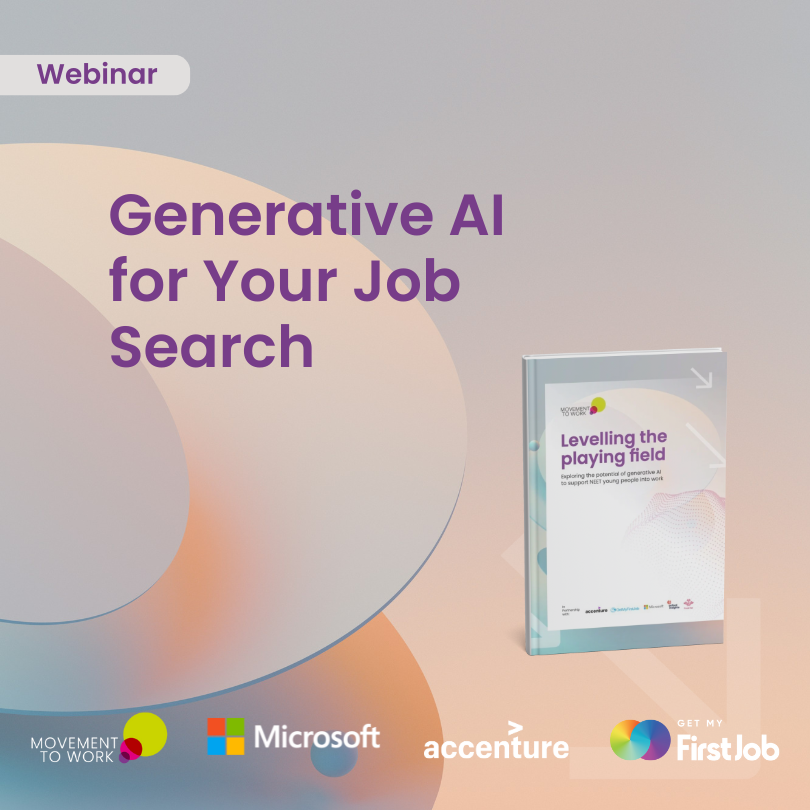Movement to Work Urges Employers to Break the ‘No Experience, No Job’ Cycle
London, 02 April 2025 – A coalition of major UK employers is taking action to support young people lacking work experience by launching a new campaign amidst the highest number of 16 to 30-year-olds not in education, employment, or training (NEET) in over a decade.
Movement to Work (MtW), a leading not-for-profit organisation working with businesses such as Accenture, BAE Systems, Barclays, Centrica, Diageo, Marriott, M&S, Tesco, and Salesforce, is calling on more employers to make work experience a meaningful pathway into employment for NEET young people through its Work Experience Works campaign.
This initiative unites committed employers and partners to refine best-practice guidance, showcase real-life success stories, and expand access to high-quality work experience opportunities. Through extensive research and collaboration, MtW has developed nine guiding principles for impactful work experience programmes that create real employment opportunities.
The Call to Action: Work Experience as a Solution to Youth Unemployment
With 987,000 young people currently NEET—the highest figure in 11 years—the need for action is urgent. Work experience is a proven tool in tackling youth unemployment, equipping young people with essential skills and exposure to the world of work.
Government initiatives like the Youth Guarantee are positive steps, but for these policies to be effective, they must be supported by structured, high-quality work experience programmes that provide genuine value to young people and employers alike.
CEO of Movement to Work on the Power of Work Experience
“In the face of rising youth unemployment and economic inactivity, removing barriers to work has never been more critical,” said Sareena Bains, CEO of Movement to Work.
“Time and again, young people tell us that the biggest barrier to securing a job is a lack of work experience. This is the harsh reality of the ‘no experience, no job’ cycle—one that leaves too many young people struggling to take their first steps into employment.
“At Movement to Work, we are dedicated to breaking this cycle. For over a decade, we have worked alongside employers and youth outreach organisations to create high-quality, accessible work experiences that do more than just fill a CV gap. These opportunities provide real-world experience, build confidence, support mental health and well-being, and help young people discover the right career path for them.”
Since its inception, Movement to Work has helped deliver over 225,000 youth opportunities, with 89% of participants securing employment, further education, or training. This initiative demonstrates the power of work experience to change lives and create lasting career opportunities.
A Win-Win for Young People and Employers
Work experience benefits both young people and businesses. For young people, it provides essential skills, career exploration, and increased employability. For employers, it opens doors to diverse, untapped talent while fostering the next generation of skilled workers.
Movement to Work has seen firsthand how work experience transforms lives. The organisation urges more businesses to step up, get involved, and support young people on their journey to employment.
Learn more and download the guidance here.
Join the Movement
Employers are encouraged to join Movement to Work’s mission and help expand access to meaningful work experiences for young people across the UK.
For more information on how to get involved, visit www.movementtowork.com or contact info@movementtowork.com.
Case Study: Gabby’s Journey to an Electrician Apprenticeship
Gabby, now in her second year of an electrician apprenticeship with BAE Systems Submarines in Barrow-in-Furness, shares her inspiring journey:
“I left school with two GCSEs—it was never a place where I felt comfortable. I started a business and performing arts courses at college, but life took a difficult turn. After leaving college and overcoming personal challenges, I pursued a Level 3 qualification in business administration and worked various jobs, including as a cleaner and social media assistant. However, I struggled to find stability.
“During the Covid-19 pandemic, I participated in the Government’s Kickstart programme and later joined a ‘Get into Engineering’ course run by the Job Centre, The Prince’s Trust, The Launch Group, BAE Systems, and Movement to Work. I enjoyed it and applied for an electrician apprenticeship.
“I started my training in September 2023, and for the first time, I feel like I’m on the right path, with a permanent job opportunity waiting at the end of my apprenticeship.”
About Movement to Work
Movement to Work is a UK charity that helps employers deliver high-quality employability opportunities for young people aged 16-30 facing barriers to work. The organisation provides fully funded professional support to businesses committed to tackling youth unemployment.
Over the past decade, Movement to Work has facilitated over 225,000 youth opportunities, including work experience, apprenticeships, sector-based work academy programmes, internships, traineeships, and entry-level roles. With an 89% success rate, the initiative has transformed thousands of lives.
Movement to Work’s Steering Group includes executive leaders from Accenture, BAE Systems, Barclays, Centrica, Diageo, Marriott, M&S, Tesco, Salesforce, and Spirax-Group, as well as representatives from The TUC, The CBI, The King’s Trust, and the Department for Work and Pensions (DWP).
The organisation’s mission is to help young people gain access to valuable work experiences as a pathway to sustainable employment while exposing businesses to diverse, emerging talent.
For media enquiries and interview opportunities, contact info@movementtowork.com.













